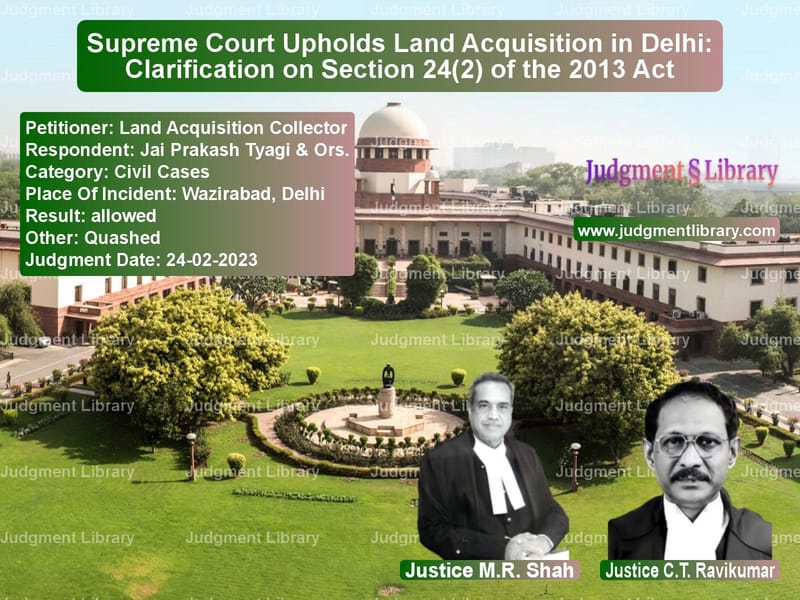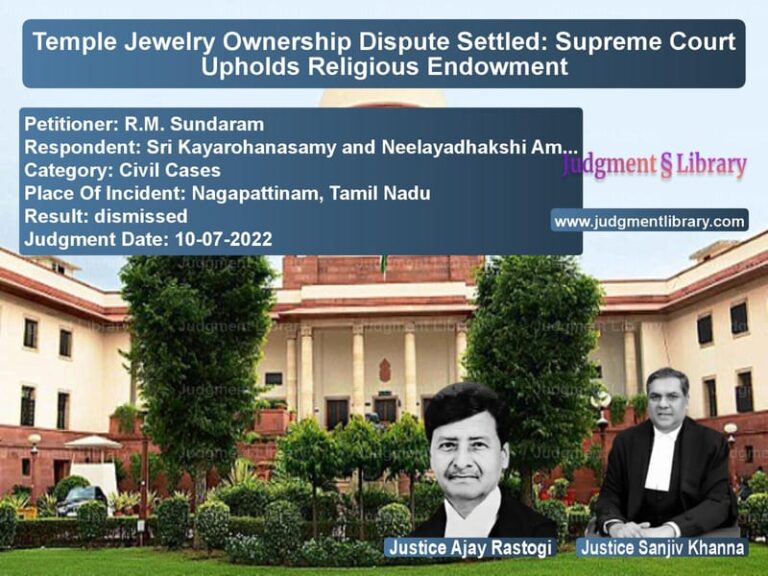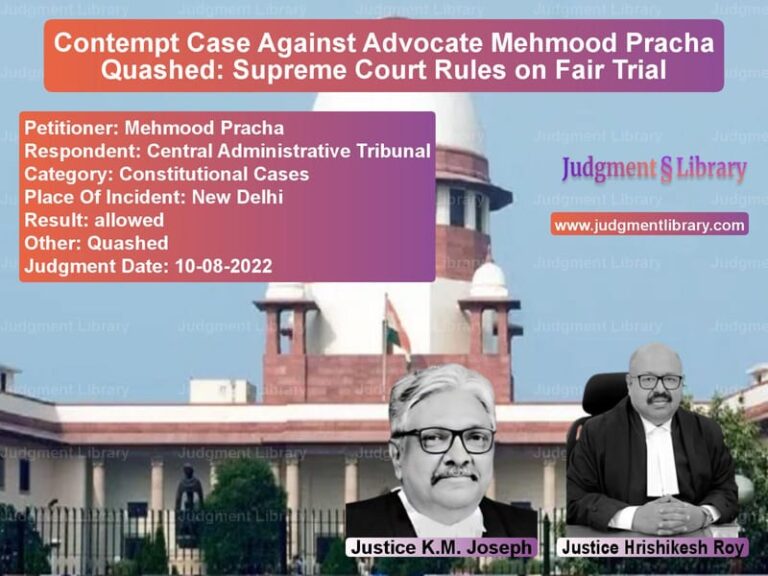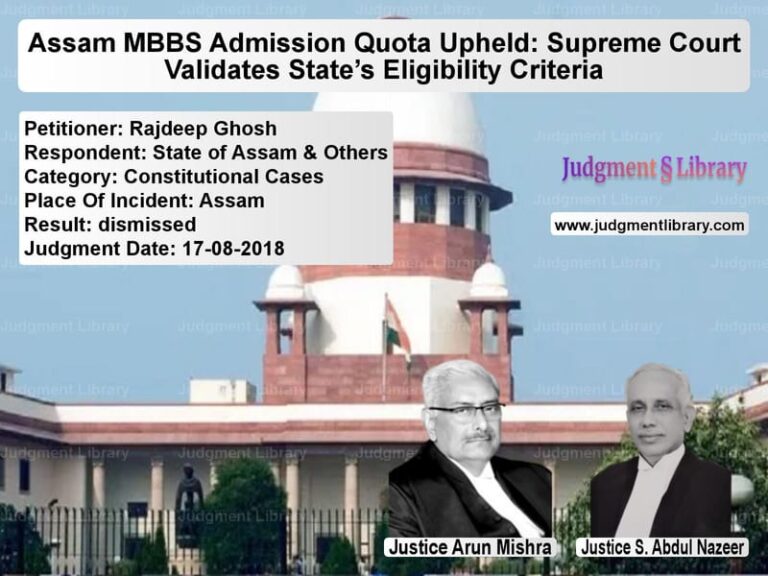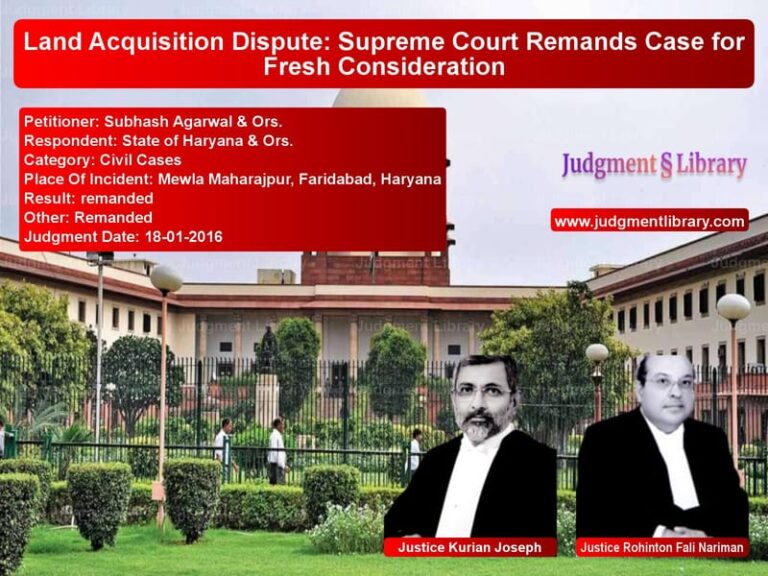Supreme Court Upholds Land Acquisition in Delhi: Clarification on Section 24(2) of the 2013 Act
The Supreme Court of India recently ruled in the case of Land Acquisition Collector vs. Jai Prakash Tyagi & Ors., addressing a long-standing dispute regarding land acquisition in Delhi under the Land Acquisition Act, 1894. The central issue was whether the acquisition proceedings for the land in question had lapsed under Section 24(2) of the Right to Fair Compensation and Transparency in Land Acquisition, Rehabilitation and Resettlement Act, 2013. The Supreme Court overturned the Delhi High Court’s ruling and upheld the validity of the acquisition.
Background of the Case
The dispute arose when the Delhi High Court, in response to a writ petition filed by the respondents, ruled that the land acquisition had lapsed due to non-payment of compensation and failure to take physical possession. The High Court relied on the Supreme Court’s earlier judgment in Pune Municipal Corporation vs. Harakchand Misirimal Solanki, which had held that deposit of compensation in a government account rather than with the landowner was not sufficient for a valid acquisition.
The Land Acquisition Collector challenged this decision, arguing that the ruling in Pune Municipal Corporation had been overruled by the Constitution Bench in Indore Development Authority vs. Manoharlal. The petitioners contended that possession had been taken for most of the land, and compensation had been deposited, fulfilling the legal requirements.
Petitioners’ Arguments
- The Land Acquisition Collector contended that possession of the land was taken on September 22, 1997, for most of the Khasra numbers in question, except for some portions that were under legal stay orders.
- They argued that the Delhi High Court erroneously relied on the now-overruled judgment in Pune Municipal Corporation, which had been clarified in Indore Development Authority.
- The petitioners asserted that mere non-payment of compensation directly to landowners does not lead to a lapse in acquisition, as long as the amount is deposited with government authorities.
- They cited multiple precedents where similar claims of lapsed acquisition had been rejected by the Supreme Court.
Respondents’ Arguments
- The respondents argued that the landowners had not received compensation and that the government’s failure to directly disburse funds rendered the acquisition invalid.
- They relied on Pune Municipal Corporation, which stated that deposit of compensation in a government treasury rather than with landowners was insufficient.
- The respondents claimed that physical possession of the land had never been taken, thereby making the acquisition incomplete.
- They contended that the right to fair compensation was a fundamental right and that the acquisition process should be invalidated due to procedural lapses.
Key Observations by the Supreme Court
The Supreme Court extensively analyzed the arguments and made the following key observations:
- The Constitution Bench ruling in Indore Development Authority had clarified that acquisition does not lapse simply because compensation is not paid directly to landowners.
- The Court held that possession of the land had been taken by the authorities, thereby fulfilling a crucial requirement for a valid acquisition.
- It was emphasized that compensation deposited in the government’s account satisfies the legal obligation of the acquiring authority.
- The Court rejected the argument that non-payment of compensation to the individual landowners invalidated the acquisition, stating that administrative delays do not annul a legally sound acquisition process.
- The bench ruled that once possession is taken and compensation is deposited, the acquisition is legally complete, and the landowners cannot challenge it decades later.
Judgment
The Supreme Court ruled in favor of the Land Acquisition Collector:
- The Delhi High Court’s decision declaring the acquisition lapsed was set aside.
- The Supreme Court held that the acquisition process remained valid under the Land Acquisition Act, 1894.
- It reaffirmed that landowners cannot challenge acquisition proceedings merely due to delays in compensation disbursal.
- The respondents’ writ petition before the High Court was dismissed.
- The Court clarified that if the original landowners had not yet received compensation, they could claim it from the government under the provisions of the Land Acquisition Act, 1894.
Implications of the Judgment
This ruling has significant implications for land acquisition laws in India:
- Clarification on Compensation Payment: The judgment establishes that compensation deposited with government authorities is legally sufficient.
- Protection of Government Acquisitions: The ruling prevents landowners from reopening acquisition cases based on technical delays in payment.
- Guidance for Future Cases: This decision sets a strong precedent for land acquisition disputes, ensuring stability in government projects.
- Upholding Legal Certainty: The Supreme Court reinforced that once an acquisition is complete, it cannot be challenged after decades based on minor procedural lapses.
Conclusion
The Supreme Court’s decision in this case is a significant ruling that upholds the legality of land acquisition processes in India. By affirming that land acquisition does not lapse due to delays in compensation, the Court has provided much-needed clarity on Section 24(2) of the Right to Fair Compensation and Transparency in Land Acquisition, Rehabilitation and Resettlement Act, 2013. This judgment ensures stability in land acquisition laws and prevents unnecessary litigation that could stall government infrastructure projects. The ruling serves as a guiding principle for similar cases in the future.
Petitioner Name: Land Acquisition Collector.Respondent Name: Jai Prakash Tyagi & Ors..Judgment By: Justice M.R. Shah, Justice C.T. Ravikumar.Place Of Incident: Wazirabad, Delhi.Judgment Date: 24-02-2023.
Don’t miss out on the full details! Download the complete judgment in PDF format below and gain valuable insights instantly!
Download Judgment: land-acquisition-col-vs-jai-prakash-tyagi-&-supreme-court-of-india-judgment-dated-24-02-2023.pdf
Directly Download Judgment: Directly download this Judgment
See all petitions in Property Disputes
See all petitions in Landlord-Tenant Disputes
See all petitions in Specific Performance
See all petitions in Damages and Compensation
See all petitions in Contract Disputes
See all petitions in Judgment by Mukeshkumar Rasikbhai Shah
See all petitions in Judgment by C.T. Ravikumar
See all petitions in allowed
See all petitions in Quashed
See all petitions in supreme court of India judgments February 2023
See all petitions in 2023 judgments
See all posts in Civil Cases Category
See all allowed petitions in Civil Cases Category
See all Dismissed petitions in Civil Cases Category
See all partially allowed petitions in Civil Cases Category

